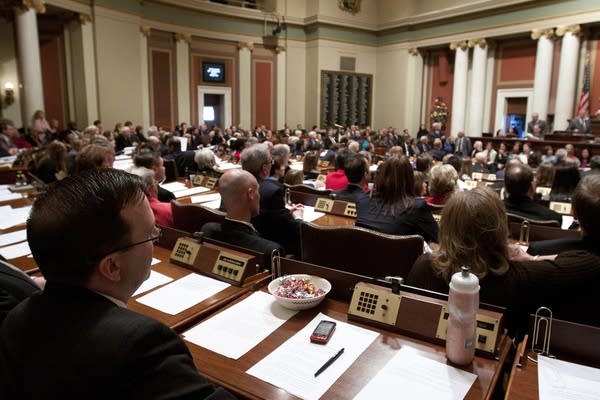Minn. GOP: Extension of budget cuts should be 'no surprise'
Go Deeper.
Create an account or log in to save stories.
Like this?
Thanks for liking this story! We have added it to a list of your favorite stories.

Republicans in the Minnesota House and Senate are proposing some early moves aimed at shrinking a projected $6.2 billion state budget deficit by about $1 billion, setting up a possible confrontation with Gov. Mark Dayton.
At the end of the 2010 session, former Gov. Tim Pawlenty and DFL legislative leaders signed off on a budget-balancing agreement that ratified some of unilateral spending cuts Pawlenty had made the year before.
Republicans who now control the House and Senate say their plan would cut spending in the current biennium. But they also want those one-time cuts of $840 million to continue for fiscal 2012 and 2013. The cuts would target higher education, state-subsidized health care, aid to local government and tax credits for renters.
Sen. Claire Robling, R-Jordan, who chairs the Senate Finance Committee, said the cuts should not shock anyone.
Turn Up Your Support
MPR News helps you turn down the noise and build shared understanding. Turn up your support for this public resource and keep trusted journalism accessible to all.
"It's no surprise to them, and should not be a surprise to them," Robling said. "When we have a projected budget deficit of $6.2 billion, they know that these will have to be continued."
Republicans say they want state government to live within its means, and they insist they can close the budget gap through cuts alone.
The bill is the first in a series of budget adjustments, said Rep. Mary Liz Hollberg, R-Lakeville, the chair of the House Ways and Means Committee.
"When you know you're out of money, stop spending."
"When you know you're out of money, stop spending," Holberg said. "This is basically what phase one says. We know that we're going to be short revenues, so stop spending unless it's absolutely necessary."
The GOP proposal also cuts spending for state agencies by $200 million in the current budget, which ends June 30. It directs the Minnesota Management and Budget commissioner to identify those cuts.
Holberg said she wants to prevent an end-of-the-fiscal-year phenomenon she called "Christmas in June."
"That urge to spend down any balances to prove that you need just as much money in the next budget cycle. We would like to prohibit that practice," she said. "Any nonessential expenditures ... that revenue to be captured to be used in the next budget cycle."
The GOP budget bill comes a full month ahead of Gov. Mark Dayton's budget proposal, which is scheduled for release on Feb. 15. The majority party traditionally waits for the governor to weigh in before offering an alternative plan.
Dayton said he wants to deal with the budget as a complete package, not piecemeal.
"To look at it from the one side, of cuts -- in the area of higher education, which will mean higher tuition for students, and local government aids, which means higher property taxes -- is just taking a too narrow perspective on it," Dayton said.
Dayton is expected to propose an income tax increase on top earners as part of his budget fix. But Republicans are opposed to any tax increases.
Senate Minority Leader Tom Bakk, DFL-Cook, said he doesn't believe GOP leaders can come up with enough spending cuts to erase the $6.2 billion deficit. Bakk said Republicans couldn't even come up with the cuts for their phase one plan.
"There's $840 million in cuts here in ratifying some of the Pawlenty unallotments," Bakk said. "And then they say, 'Oh, Gov. Dayton over at [Minnesota Management and Budget], find us another $200 million in cuts.' They don't want to do the work themselves, which I think is part of being in the majority -- digging through those state budgets and trying to prioritize.
"Now they're asking the bureaucrats in the department to identify $200 million in cuts," Bakk said of Republican legislators. "So, I think for anybody to say there's $1 billion in cuts here, that's just not accurate."
House and Senate committees are expected to take quick action on the proposal. GOP leaders say an early February passage would lower the deficit before the next state economic forecast comes out in early March.
They also predict that a better-than-expected revenue picture could shrink the projected deficit even more.




